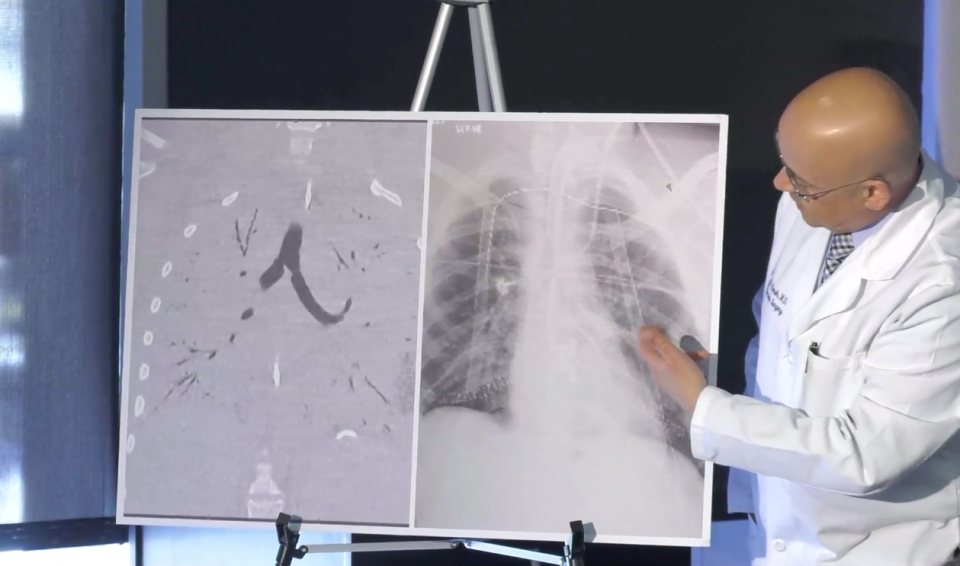Teen who received double lung transplant for vaping illness was ‘days’ from death, doctors say
In a press conference on Tuesday, doctors at Detroit's Henry Ford Hospital revealed that they have performed the first double lung transplant on a teenage patient with a vaping-related illness — a major development in the growing EVALI (e-cigarette or vaping product use associated lung injury) crisis.
“Our teenage patient would have faced certain death if it weren’t for the lung transplant,” Hassan Nemeh, MD, a thoracic surgery specialist in Detroit who participated in the transplant, told reporters. Nemeh and other doctors from Henry Ford described the patient as a 17-year-old male who was admitted to a Detroit-area local hospital in early September for what appeared to be pneumonia.
But as the teen’s condition worsened, he was transferred to the intensive care unit at Detroit Children’s Hospital where he was diagnosed with EVALI and put on life support. As he continued to deteriorate, the teen was put on the list for a lung transplant and — because of his age and the severity of his condition — he was granted a transplant in mid-October.
Doctors said that the teen was a “matter of days” before dying if it hadn’t been for the transplant. The surgery, which took roughly six hours, was done to fully replace both lungs. Nemeh, a longtime surgeon, said that the appearance of the lungs was worse than he expected. “What I saw in his lungs was something I’ve never seen before — and I’ve been doing lung transplants for 20 years,” Nemeh told reporters Tuesday. “There was an enormous amount of inflammation ... the lung was so scarred that we had to literally deliver it out of the chest. This is an evil I haven’t faced before.”

While the identity of the patient has not yet been revealed, Lisa Allenspach, MD, the medical director for the Henry Ford Hospital Lung Transplant Program shared a statement from the family. “We ask Henry Ford doctors to share that the horrific life-threatening effects of vaping are very real,” the statement read. “Our family could never have imagined being at the center… of this crisis. Within a very short period of time, our lives have been forever changed.”
The family went on to describe their son as a “perfectly healthy” 17-year-old and athlete who — before his EVALI diagnosis — enjoyed sailing with friends and playing video games. The family said they never imagined him having to wake up with two new lungs, but that they are “forever grateful” to the hospital.
The news comes on the heels of a major breakthrough from the Centers for Disease Control and Prevention on Friday in which experts identified Vitamin E acetate, a honey-like substance used to thicken vaping products, as one of the toxins fueling the crisis. One day before the announcement, the number of EVALI cases surpassed 2,000, spanning every state but Alaska. Thirty-nine of those cases have proven fatal with the median age of the deceased being 53.
The illness, which causes pneumonia-like symptoms such as shortness of breath, coughing, fever, and diarrhea, can result in a build-up of fluid known as “wet lung,” leading to complete lung failure. Although the majority of those with EVALI eventually recover, many say they leave the hospital with limited functionality while others find themselves having to get readmitted when symptoms don’t clear up.
In a November 8 study published in the Lancet, doctors from Intermountain Healthcare in Utah published a guide on “best practices” for the treatment of EVALI, outlining the use of either oral steroids or, in more serious cases, intravenous steroids to help patients regain lung function. The guidelines are based on the treatment of 60 patients with EVALI in over 200 different clinics.
Lung transplants, which are used to replace a “diseased or failing lung,” are not mentioned. But they have been used (and are currently) to save patients who are gravely ill —specifically, from Chronic obstructive pulmonary disease (COPD), an obstructive lung disease often caused by smoking.
According to the University of Michigan, roughly 2,000 people in the U.S. receive lung transplants each year. But for Remzi Bag, MD, medical director of the lung transplant program at the University of Chicago Medicine, the idea of lung transplants for EVALI patients is complicated. “There is a tremendous scarcity of organs,” Bag tells Yahoo Lifestyle. “Lung transplant programs have to find a way to figure out whether this precious gift of donation would be taken good care of by the recipient.” He says offering more lung transplants may be the “wrong way to prevent death from vaping” as it fails to fix the problem itself.
Ilona Jaspers, PhD, the deputy director of the Center for Environmental Medicine, Asthma, and Lung Biology at the University of North Carolina at Chapel Hill, agrees. “Lung transplant should be a last resort,” she tells Yahoo Lifestyle. As one of the leading researchers on vaping in the U.S., she hopes that the focus will turn to prevention, not drastic surgeries.
“I would not think that lung transplants are the ‘procedure of choice’ for EVALI patients in the future,” says Jaspers. “More emphasis on prevention, early detection, and treatment of the disease to reverse the lung damage should be placed rather than opting for a lung transplant. Also, similar to COPD patients, a 6-months cessation of the vaping habit or evidence for readiness/willingness to quit the vaping habit could be part of the evaluation and recommendation.”
Correction: An earlier version of this piece described the patient as a 16-year-old. The patient is 17.
Read more from Yahoo Lifestyle:
CDC makes 'breakthrough' on vaping crisis, names vitamin E oil as potential culprit
Zantac is being recalled in the U.S. and Canada 'due to possible contamination'
Follow us on Instagram, Facebook and Twitter for nonstop inspiration delivered fresh to your feed, every day.
